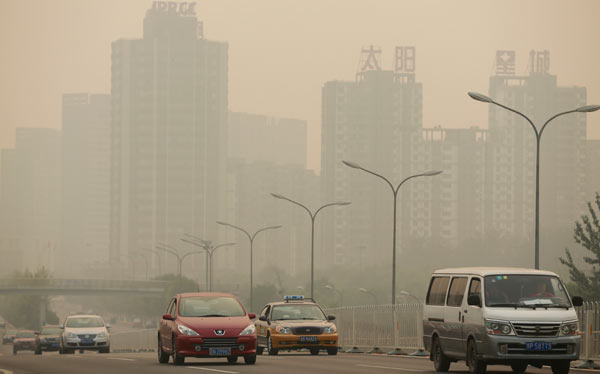
 |
|
Beijing is shrouded by smog again on Wednesday. The city transport authority plans to tackle one of the major causes of fine particulate matter by restricting the operation of cars and vans according to their license numbers. Feng Yongbin / China Daily |
Experts question plans to reduce traffic pollution
Attempts to halve the number of vehicles on Beijing's roads on days when there are seriously high levels of pollution still face challenges, experts say.
The capital's transport authority is planning to restrict cars and vans according to odd or even license numbers on days of heavy pollution.
The move comes at a time of rising public concern about air pollution in the capital.
The traffic control measure is aimed at tackling one of the major causes of fine particulate matter and to ease heavy smog in the city, said Beijing Environmental Protection Bureau.
However, in view of the need to inform commuters about the traffic controls in advance, along with the difficulty of predicting days when there will be serious pollution, experts said the plan is not easy and could cause chaos if carried out poorly.
"It is necessary to inform the public in advance," said Xie Shaodong, a professor at Peking University's School of Environmental Sciences.
Based on the current prediction capability, it is feasible to forecast the pollution level three days in advance, he said.
The authorities say they are studying further details to avoid unnecessary inconvenience to the public, while insiders say it is likely the plan will be launched by the end of the year.
Qiao Lin, director of the Beijing Meteorological Bureau, said predicting days when there is serious pollution requires joint efforts from the meteorological and environmental protection bureaus.
The meteorological department is in charge of forecasting weather conditions and monitoring serious pollution, while the Environmental Protection Bureau is responsible for monitoring and warning of major pollutants.
Xie said restricting vehicles according to their license plate numbers will have an effect, but this might be negative if the forecast is inaccurate.
Wang Gengchen, a researcher at the Chinese Academy of Sciences' Institute of Atmospheric Physics, is also worried about the negative effect of inaccurate weather forecasting.
He said that as the forecast will lead not only to some vehicles being barred from the roads, but also affect industrial production, classes for students and close construction sites, the forecast must be accurate and delivered on time.
Qiao said the bureau will improve its forecasting ability to reduce the chances of inaccurate predictions and warnings.
The meteorological department gives daily updates on Sina Weibo, the Chinese equivalent of Twitter, on the weather conditions affecting the spread of pollution.
In addition to the concerns voiced by experts, some members of the public are not optimistic about the effect of the traffic control measures.
"It is fine to introduce the odd-and-even license plate rule, but I don't think it really helps," said Lu Wei, a 45-year-old private trading company owner.
"The rule may slightly ease pollution pressure for a while, but as long as the number of private cars on the roads rises and cars with excessive emissions are not prohibited, such a rule might not have any effect."
Lu said it is important to curb other major sources of pollution, such as the cement and steel industries, rather than disturb people's daily lives.
Lu Guangtian, 26, a bank clerk in Beijing, said that if vehicles are restricted on days of heavy pollution according to their license plate numbers, the government should offer compensation to the owners.
"It is unfair if you have just bought a car and are forbidden from driving it on the roads," he said.
But Sun Changliang, a 43-year-old engineer, said, "It's worthwhile having a breath of fresh air in exchange for not being able to drive for a day."
zhengxin@chinadaily.com.cn
